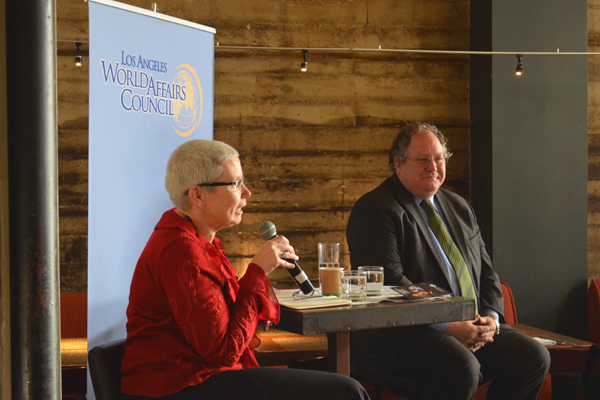 Sophie Richardson and Clay Dube discuss human rights in China on January 24, 2019.
Sophie Richardson and Clay Dube discuss human rights in China on January 24, 2019.
“We are going to lose a few rounds before we start winning, but we have to get busy losing for those people who are suffering,” said Sophie Richardson, China director for Human Rights Watch, about the detention of Uyghurs in Xinjiang, China. Human Rights Watch has documented human rights abuses including surveillance, threats, and forced indoctrination of the Turkic Muslim minority in detention facilities that China is calling political education camps. Richardson also spoke of 40 documented disappearances of Uyghur men and boys, only one of whom they have been able to locate. “That’s a powerful statement about what China will do with people they don’t like.”
Richardson said that according to China, Xinjiang is a national security crisis. “It’s a terrorist threat that must be managed.” In her team’s research, they have interviewed Chinese officials who said they were proud of the camps because there hasn’t been any extremist violence in China since the detentions began. “But that begs the question of ‘What kind of violence?’ There’s no recognition that they are committing violence or they might produce it in the future by their current actions.”
Clay Dube, moderator and Director of the USC US-China Institute, said that “any group with moral authority presents a challenge to the Chinese government, from their perspective.” Richardson and Dube spoke about the plight of Catholics in China and how the Vatican has sought to change the views of the Chinese government on religion to ease restrictions on worship. “The highest loyalty in China always has to be to the party. My money is not on the Vatican,” added Richardson.
In March 2018, the UN Human Rights Committee advanced a Chinese-proposed resolution on human rights cooperation. According to Richardson, the document was heavily flawed and advances certain ideas that human rights abuses aren’t the responsibility of governments. “A shocking number of governments essentially said ‘Well they’re trying,’ and they either voted for it or abstained to language that, in the long term, could move to legally binding treaties. This leaves me very worried.” The only country that voted against the resolution was the US.
